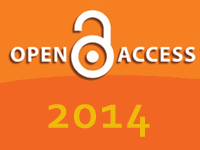The University of Arkansas Libraries joins institutions worldwide to celebrate International Open Access Week, October 20-26, 2014.
Open Access Week is a global event that promotes free, immediate online access to scholarly research. The Open Access initiative is dedicated to transforming the traditional closed and costly system of scholarly research distribution into one that quickly opens up important scholarly research to everyone, everywhere. According to The Right to Research Coalition, a coalition started by students in 2009, the Open Access model unlocks price barriers to allow research to reach anyone who needs it, regardless of university affiliation, geographic location, or ability to pay.
Authors provide Open Access articles by depositing them in a variety of open systems: by publishing on their own sites, through journals and consortiums that make open access a priority, or through institutional repositories. Though these options are not free, the cost to publish is greatly reduced by using the internet, especially when an institution invests in an institutional repository. Benefits from the investment include ease of self-publishing, increased visibility for the institution and its researchers, and increased impact of their research.
Provost Sharon L. Gaber has formed a coordinating committee to investigate the possibility of implementing an institutional repository at the University of Arkansas so that authors can easily participate in the Open Access system, making the important research being done at the University of Arkansas immediately available worldwide. Co-chairs for the committee are Carolyn Henderson Allen, Dean of University Libraries, and Jim M. Rankin, Vice Provost for Research and Economic Development.
Gaber noted, “An institutional repository has the potential to open up the university’s output to a wide audience, including the citizens of Arkansas, who potentially could benefit from research being conducted right here in our state. It would help move us toward achieving two of Chancellor G. David Gearhart’s TAP goals, by being transparent and accountable to the people of Arkansas and by marshaling the university’s expertise to grow the state’s knowledge-based economy.”
The University Libraries are also participating in a program from the Royal Society of Chemistry that will enable University of Arkansas Scholars to publish their articles Open Access in any of the 34 RSC journals free of charge. This initiative provides the Libraries with voucher codes that University of Arkansas authors can use to make their papers freely accessible to all.
Another Open Access platform gaining momentum is SCOAP3, a relatively new consortium that supports the publication of Open Access articles in high-quality peer-reviewed journals in the field of high-energy physics. Articles are Open Access at no cost for any author, authors retain copyright, and licensing practices enable wide availability and re-use of the information. The University of Arkansas Libraries are one of about two thousand libraries and research organizations partnering with SCOAP3, and the list is still growing.
For more information, consult the University Libraries’ LibGuide on Open Access which contains resources on author’s rights, Open Access mandates and policies at various universities, global OA initiatives, ideas for paying for OA, and blogs on scholarly communication and OA publisher initiatives. The LibGuide also contains a printable poster that explains authors’ rights within the Open Access model.



